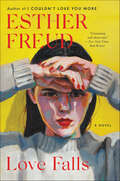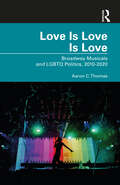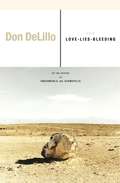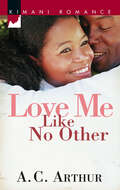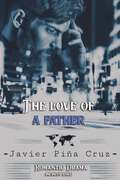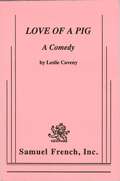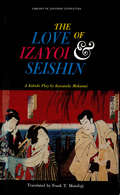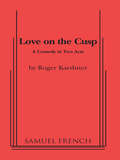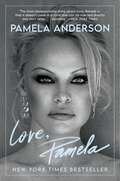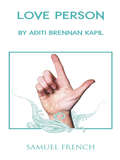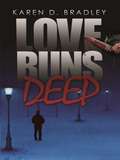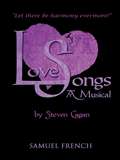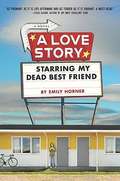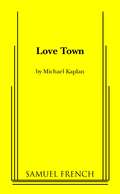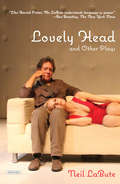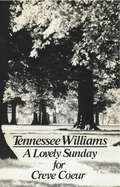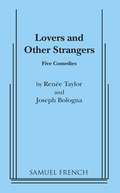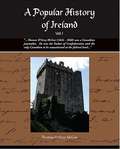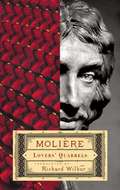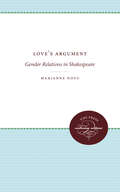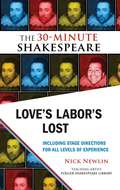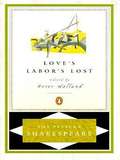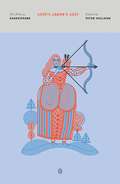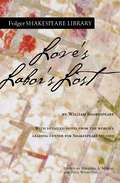- Table View
- List View
Love Falls: A Novel
by Esther FreudThe highly praised author of Hideous Kinky, returns with a searing and sensuous tale young love set amid the heat and beauty of a Tuscan summerThe Independent calls Esther Freud “the best writer on childhood we have.” In Love Falls this brilliant novelist proves her power once again with an utterly charming and irresistible tale of adolescent love and self-discovery set in a foreign land.When 17-year-old Lara accepts her father’s invitation to accompany him to Tuscany for the summer, she’s excited and trepidatious. But, her fears prove groundless, for the villa’s closest neighbors are the contagiously adventurous Willoughbys, the teenaged brood of a wealthy British lord. Caught up in their torrential good humor—and snared particularly by Kip Willoughby’s dark, flirtatious eyes—Lara sets off on a summer adventure full of danger, first love, and untold consequences that will change her life.
Love Is Love Is Love: Broadway Musicals and LGBTQ Politics, 2010-2020
by Aaron C. ThomasThe politics of Broadway musicals matter a great deal more to U.S. American culture than they appear to mean, and they are especially important to mainstream politics surrounding sex, gender, and sexuality. Love Is Love Is Love looks to the Broadway musicals of the past decade for help understanding the current state of LGBTQ politics in the United States. Through analyses of Promises, Promises, Newsies, Hedwig and the Angry Inch, The Color Purple, and Frozen, this book attempts to move past the question of representational politics and asks us instead to think in more complex ways about LGBTQ identity, what LGBTQ politics are, and the politics of Broadway musicals themselves. Producing new, complex readings of all five of these musicals, author Aaron C. Thomas places each of them within the context of the LGBTQ politics of their day. Some of the issues the book treats are controversies of casting, the closetedness and openness of musical theatre, LGBTQ identities, adaptation from movies into musicals, and the special power of the musical form by examining how these shows differ from the books and movies on which they’re based. Love Is Love Is Love places contemporary LGBTQ political tensions and conversations in a new light, making this an essential companion for students and scholars of contemporary theatre, musical theatre, cultural studies, Queer studies, and gender studies.
Love-Lies-Bleeding
by Don DelilloLove-Lies-Bleeding, Don DeLillo's third play, is a daring, profoundly compassionate story about life, death, art and human connection. Three people gather to determine the fate of the man who sits in a straight-backed chair saying nothing. He is Alex Macklin, who gave up easel painting to do land art in the southwestern desert, and he is seventy now, helpless in the wake of a second stroke. The people around him are the bearers of a complicated love, his son, his young wife, the older woman -- his wife of years past -- who feels the emotional tenacity of a love long-ended. It is their question to answer. When does life end, and when should it end? In this remote setting, without seeking medical or legal guidance, they move unsteadily toward last things. Luminous, spare, unnervingly comic and always deeply moving, Love-Lies-Bleeding explores a number of perilous questions about the value of life and how we measure it.
Love Me Like No Other
by A.C. ArthurTwo Can Play at This Game!Lincoln can’t believe it—that beautiful babe who owes his casino $5,000 is Jade. He’s never stopped thinking about her since that one hot night years ago. Now she’s in his debt! Of course, he doesn’t want her money….At first, Jade’s outraged—pose as his fiancée for one week or he’ll call the police! But then…how about some sweet revenge? So while he’s playing Mr. Seducer, she’ll be Miss Tease. Before the week is up, she’ll have him on his knees—just before she walks away! That is, if she can convince her heart she’s not still in love….
The love of a father (Infinite Love #1)
by Javier Piña CruzLove is a simile of pain… Every now and then, love shatters uswithin our heart, in pieces of apuzzle we are incapable of fitting again until that long lost piece missing, appears, enters your life and, without knowing how, you are fulfilled again. I am called Daniel and I learnt the feeling when your heart is crushed and at the same time, the happiness thanks to Náyade, my child and world. Due to this, time was the only witness of my scars, and when I thought I was going down again, love held me to teach me, once again, to be strong. My history is part of life, and life is no hallway of roses. There was a time that, for me, all was a chaos of events which almost cracked me, cause hell broke lose and wanted to tear apart me from what the love of a father means.
Love of a Pig
by Leslie CavenyComedy / 4m, 4f to play 33 characters / Unit set / Jenny is a young violinist pleased with her life except for when it comes to men. Having spent 3,345 nights alone of a possible 3,356 since puberty, she approaches scientifically the question "Why not me?" The play chronicles her pursuit of a brooding bass player she mistakenly assumes is Mr. Right.
The Love of Izayoi & Seishin: A Kabuki Play by Kawatake Mokuami
by Kawatake Mokuami Frank T. MotofujiThis dramatic and absorbing play tells the story of the courtesan Izayoi and the priest Seishin; classic lovers who are doomed to suffer the tragic consequences of their passion.<P><P>As a representative example of Japanese play writing of the 19th century The Love of Izayoi and Seishin is a superlative example of the turbulence and dramatic incident that are the major conventions of Kabuki.The intricate plot involves murder, attempted suicide, hari-kiri, theft, and the usual stunning Kabuki denouement. This specific feature is one of the intriguing aspects of Kabuki drama, and continually keeps the stage alive with action and violence.Complete with stage directions and complementary instructions, this play can be read with pleasure for its own sake, or as a gripping Kabuki narrative for all enthusiasts of the theater.
Love on Cue
by Catherine HapkaWhen you have to sing your heart out, it's best to know how.... Maggie Tannery is a true theater girl and a total shoo-in for the lead in this year's school production of Romeo and Juliet. She's seriously psyched because it looks like her crush, Daniel, might be playing her Romeo both on- and offstage -- if all goes as planned. But when her school decides to perform a musical instead, Maggie catches a major case of stage fright -- because she can't sing! With her lead role in jeopardy, as well as her chance of winning her leading man, Maggie turns to the musically talented Nico to give her voice lessons. But their voices aren't the only things that seem to be harmonizing. As Maggie tries to break a leg -- and not her heart -- she wonders who the music man of her dreams really is....
Love On The Cusp: A Comedy in Two Acts
by Roger KarshnerJerry comes unglued when his wife, Eleanor, an astrology nut, informs him they can't have sex for thirty days because her planet is in retrograde. Jerry and his sports loving buddy, Marvin, conspire against Eleanor's rip off advisor, Rhoda. But when Rhoda arrives on the scene, Marvin does a complete flip flop and falls for her instantly. Rhoda advises Eleanor that she's about to be visited by "an overpowering electric influence" which manifests itself in the person of Joe, handsome TV repairman. Eleanor falls for Joe who Jerry rightly spots as phony who's trying to get my wife's money on horizontal hold. Joe wins the moment and Jerry is forced out of the house into a crummy apartment. But Jerry the super salesman and manipulator deftly maneuvers the situation, rekindles Eleanor's love, awakens Marvin and exposes Rhoda and Joe.
Love, Pamela: A Memoir
by Pamela AndersonThe actress, activist, and once infamous Playboy Playmate reclaims the narrative of her life in a memoir that defies expectation in both content and approach, blending searing prose with snippets of original poetry.In this honest, layered and unforgettable book that alternates between storytelling and her own poetry, Pamela Anderson breaks the mold of the celebrity memoir while taking back the tale that has been crafted about her.Her blond bombshell image was ubiquitous in the 1990s. Discovered in the stands of a football game, she was immediately rocket launched into fame, becoming Playboy’s favorite cover girl and an emblem of Hollywood glamour and sexuality. But what happens when you lose grip on your own life—and the image the notoriety machine creates for you is not who you really are?Growing up on Vancouver Island, the daughter of young, wild, and unprepared parents, Pamela Anderson’s childhood was not easy, but it allowed her to create her own world—surrounded by nature and imaginary friends. When she overcame her deep shyness and grew into herself, she fell into a life on the cover of magazines, the beaches of Malibu, the sets of movies and talk shows, the arms of rockstars, the coveted scene at the Playboy Mansion. And as her star rose, she found herself tabloid fodder, at the height of an era when paparazzi tactics were bent on capturing a celebrity’s most intimate, and sometimes weakest moments. This is when Pamela Anderson lost control of her own narrative, hurt by the media and fearful of the public’s perception of who she was…and who she wasn’t.Fighting back with a sense of grace, fueled by a love of art and literature, and driven by a devotion to her children and the causes she cares about most, Pamela Anderson has now gone back to the island where she grew up, after a memorable run starring as Roxie in Chicago on Broadway, reclaiming her free spirit but also standing firm as a strong, creative, confident woman.
Love Person
by Aditi Brennan KapilDramatic Comedy. 1m, 3f. Interior. Love Person is a four part love story in Sanskrit, ASL and English in which love transcends sexual orientation, physical attraction, and social structure and rests instead on the ways in which we communicate and how communication bonds or breaks us. The play is structured around four Sanskrit love poems that influence and reflect the journeys of the characters. Free, a Deaf woman in a relationship with Maggie, accidentally falls into a deceptive email correspondence with her sister Vic's love interest Ram, a Sanskrit professor. Free and Ram discover a connection, based largely on an affinity between their two languages. As a result of the deception, Vic and Ram also begin to fall in love. Meanwhile Free and Maggie's relationship struggles to survive. “Kapil’s Love Person is a fascinating brew of emotion, wit and intellect that challenges its audience to reassess how the form of communication shapes understanding.” —Lisa Brock, Minneapolis Star Tribune. “Startling and evocative!” —Michael Opperman, Twin Cities Daily Planet. “Heart-pounding attraction, intense all-night conversations - Aditi Brennan Kapil’s Love Person captures the giddiness of new love affairs. But the play is even more eloquently realistic about the wear and tear that time wreaks on relationships.” —Nicole Estvanik, American Theatre Magazine, July 2008
Love Runs Deep
by Karen D. BradleyAfter Tyler Bradford has a run in with the Chameleon, she finds herself gunned down and bleeding in the snow next to her best friend, Lorrain. Her entire world changes when Lorrain dies. She becomes determined to make the Chameleon pay for his crimes. However, she isn't the only one on a mission. The Chameleon is hunting her down to finish what he started. Their paths will cross, yet only one of them will accomplish their goal. Tyler's love for Lorrain runs deep, but will it be the very thing that gets her killed?
Love Songs
by Steven CaganMusical / Steven Cagan / 3m, 3f / Simple Sets / Love Songs is a truly extraordinary musical theatre experience, the return of romance to the stage! Believe in the healing power of love and romance once again. Steven Cagan's glorious work expresses the truth, beauty and hopefulness that we all strive for in this journey called life through the story of three couples. Jeremy is stuck out of town on a business trip for Roy's ad agency, trying frantically to get back in time for his nuptials. His betrothed, Gaby, is anxious for him to return. Sarah, who has been engaged to Ben for six years, is weary of his failure to commit to her. Ben has been idealizing a kind of love that does not really exist. Roy and Rose, lovers for many years, just enjoy themselves. How will their stories work out? Love Songs is timeless in its appeal. Let there be harmony evermore! "How wonderful...it really is terrific!" - Marvin Hamlisch "Truly, the harmonic color and lyrical poetry make this an extraordinary achievement."- Michael Feinstein "Love Songs - A Musical embraces essential contemporary relationships with humor and compassion. The songs are memorable, the stories are timeless." - Lynne Taylor-Corbett (Director/Choreographer & Tony Award nominee for Swing!)
A Love Story Starring My Dead Best Friend
by Emily HornerFor months, Cass has heard her best friend, Julia, whisper about a secret project. When Julia dies in a car accident, her drama friends decide to bring the project--a musical called Totally Sweet Ninja Death Squad--to fruition. But Cass isn't a drama person. She can't take a summer of painting sets, and she won't spend long hours with Heather, the girl who made her miserable all through middle school and has somehow landed the leading role. So Cass takes off. In alternating chapters, she spends the first part of summer on a cross-country bike trip and the rest swallowing her pride, making props, and--of all things--falling for Heather. This is a story of the breadth of love. Of the depth of friendship. And of the most hilarious musical one quiet suburb has ever seen.
Love Town
by Michael KaplanComedy 5m, 3f, Possible Cast Expansion / Interior Sea Spray is a charming beach town, perfect for romantic getaways and cliff-side proposals. While tourists walk around with stars in their eyes, the locals take their lumps and watch their relationships fray and fizzle. Karl is a self-professed good guy who bought the little village dream for his wife, only to have her run off with the town aromatherapist. Now he's stuck with a quaint souvenir shop he never wanted, and the vengeful impulse to run it into the ground. As the local merchants scheme to drive Karl away, his bitter emporium becomes a safe haven for the romantically scarred men of Sea Spray. "...Clever and funny, laced with jokes. A quirky adult comedy that will stand on its own in any community" - The Tribune "[Love Town] unmasks the truth that lies beyond artificial social niceties, revealing an authenticity behind the brightly painted facade that little towns display to the world." - New Times of the Central Coast
Lovely Head and Other Plays
by Neil LabuteNeil LaBute is arguably the most challenging, provocative, and acclaimed playwright of his generation. Lovely Head and Other Plays brings together his most masterful and affecting recent shorter works. The title play, which had its American premiere at La MaMa in 2012, rivetingly explores the relationship between a nervous older man and a glib young prostitute, as their evening together drives toward a startling conclusion. Also included is the one-act play The Great War, which looks at a divorcing couple and the ground they need to cross to reach their own end of hostilities; In the Beginning, which was written as a response to the Occupy movement and produced around the world in 2012-13 as part of Theatre Uncut; The Wager, the stage version of the film Double or Nothing starring Adam Brody; the two-handers A Guy Walks Into a Bar, Over the River and Through the Woods, and Strange Fruit; and two powerful new monologues, Bad Girl and The Pony of Love.
A Lovely Sunday for Creve Coeur
by Tennessee WilliamsIt is a warm June morning in the West End of St. Louis in the mid-thirties--a lovely Sunday for a picnic at Creve Coeur Lake. But Dorothea, one of Tennessee Williams's most engaging "marginally youthful," forever hopeful Southern belles, is home waiting for a phone call from the principal of the high school where she teaches civics--the man she expects to fulfill her deferred dreams of romance and matrimony. Williams's unerring dialogue reveals each of the four characters of A Lovely Sunday for Creve Coeur with precision and clarity: Dorothea, who does even her "setting-up exercises" with poignant flutters; Bodey, her German roommate, who wants to pair Dotty with her beer-drinking twin, Buddy, thereby assuring nieces, nephews, and a family for both herself and Dotty; Helena, a fellow teacher, with the "eyes of a predatory bird," who would like to "rescue" Dotty from her vulgar, common surroundings and substitute an elegant but sterile spinster life; and Miss Gluck, a newly orphaned and distraught neighbor, whom Bodey comforts with coffee and crullers while Helena mocks them both. Focusing on one morning and one encounter of four women, Williams once again skillfully explores, with comic irony and great tenderness, the meaning of loneliness, the need for human connection, as well as the inevitable compromises one must make to get through "the long run of life. "
Lovers and Other Strangers
by Renee TaylorFive Comedies . Characters: 6 male, 6 female. 4 interior sets.. A hit on Broadway and later on film, this edition includes the popular sequence Hal and Cathy created for the film and played by Gig Young and Anne Jackson. The other stories include Brenda and Jerry in a planned seduction gone wrong. Johnny and Wilma have been married so long that they can't remember who starts what. With Mike and Susan, on the eve their wedding, he's getting cold feet and she must gently talk him down the aisle. In the last, Bea, Frank, Richie and Joan, a long-married couple who have fought for over thirty years try to save their son's marriage by confessing to their own failures. . "A lot of smiles as well as genuine belly laughs."-N.Y. Times . "Realistic and observant.... sketch[es] a character with a few strokes."-N.Y. Post . "Very funny and engaging."-Wall Street Journal
A Lover's Complaint
by William Shakespeare"A Lover's Complaint" is a narrative poem published as an appendix to the original edition of Shakespeare's Sonnets. It is given the title "A Lover's Complaint" in the book, which was published by Thomas Thorpe in 1609. <P> <P> Although published as Shakespeare's work, the poem's authorship has become a matter of critical debate. The majority opinion is that it is by Shakespeare, though of inferior quality to his other works. <P> <P> The poem consists of forty-seven seven-line stanzas written in the rhyme royal (with the rhyme scheme ababbcc), a metre and structure identical to that of Shakespeare's poem The Rape of Lucrece. After a scene-setting introduction, the poem takes the form of a lengthy speech by an abandoned young woman, including a speech within her speech, as she recounts the words by which she was seduced.
Lovers' Quarrels
by Jean Baptiste De Molière Richard Wilbur"I came to see that a line that simply says 'I love you,' at the right point in the show, is entirely adequate, that a great deal of verbal sophistication is not necessarily called for. . . . Speak-ability is so important. That's something I slowly had to learn about poetry, and something I had to work on always with Molière."--Richard WilburLovers' Quarrels is Molière's second full-length verse play, animated with deception and tangles of love.Richard Wilbur is a two-time winner of the Pulitzer Prize and a former Poet Laureate of the United States. His verse translations of Molière's plays have been performed for audiences throughout the world.
Love's Argument: Gender Relations in Shakespeare
by Marianne NovyNovy demonstrates how the plays are theatrical transformations of tensions in both ideals and practices in Renaissance society. Analyzing the dramatic images of lover and beloved, of husband and wife, of parent and child, Novy examines the ways in which the conflicts are resolved in the comedies and romances and how they are acted out in the tragedies. Chapters on individual plays provide original interpretations that delineate the tone and texture of gender relations.A UNC Press Enduring Edition -- UNC Press Enduring Editions use the latest in digital technology to make available again books from our distinguished backlist that were previously out of print. These editions are published unaltered from the original, and are presented in affordable paperback formats, bringing readers both historical and cultural value.
Love's Labor's Lost: The 30-Minute Shakespeare
by Nick NewlinLove's Labor's Lost: The 30-Minute Shakespeare plays three action-packed scenes from this tale of King Navarre and his three lords, who have vowed to retire from women for three years. Naturally, the Princess of France and her three ladies arrive, and comedic courtship ensues.The cutting includes the ridiculous dance of the lords disguised as Russians, the hysterical "Pageant of the Nine Worthies," and a dramatic, bittersweet ending that leaves the King and the three lords laboring for love.The edition includes a preface by Nick Newlin containing helpful advice on how to put on a Shakespeare performance in a high school class with novice actors, as well as an appendix with suggestions for the specific play and recommendations for further resources.
Love's Labor's Lost
by William Shakespeare A. R. Braunmuller Stephen Orgel"I feel that I have spent half my career with one or another Pelican Shakespeare in my back pocket. Convenience, however, is the least important aspect of the new Pelican Shakespeare series. Here is an elegant and clear text for either the study or the rehearsal room, notes where you need them and the distinguished scholarship of the general editors, Stephen Orgel and A. R. Braunmuller who understand that these are plays for performance as well as great texts for contemplation." (Patrick Stewart) The distinguished Pelican Shakespeare series, which has sold more than four million copies, is now completely revised and repackaged. Each volume features: * Authoritative, reliable texts * High quality introductions and notes * New, more readable trade trim size * An essay on the theatrical world of Shakespeare and essays on Shakespeare's life and the selection of texts
Love's Labor's Lost: Webster's Italian Thesaurus Edition (The Pelican Shakespeare)
by William Shakespeare Peter Holland Stephen Orgel A. R. BraunmullerThe acclaimed Pelican Shakespeare series edited by A. R. Braunmuller and Stephen Orgel The legendary Pelican Shakespeare series features authoritative and meticulously researched texts paired with scholarship by renowned Shakespeareans. Each book includes an essay on the theatrical world of Shakespeare’s time, an introduction to the individual play, and a detailed note on the text used. Updated by general editors Stephen Orgel and A. R. Braunmuller, these easy-to-read editions incorporate over thirty years of Shakespeare scholarship undertaken since the original series, edited by Alfred Harbage, appeared between 1956 and 1967. With definitive texts and illuminating essays, the Pelican Shakespeare will remain a valued resource for students, teachers, and theater professionals for many years to come. For more than seventy years, Penguin has been the leading publisher of classic literature in the English-speaking world. With more than 1,800 titles, Penguin Classics represents a global bookshelf of the best works throughout history and across genres and disciplines. Readers trust the series to provide authoritative texts enhanced by introductions and notes by distinguished scholars and contemporary authors, as well as up-to-date translations by award-winning translators.
Love's Labor's Lost
by William Shakespeare Paul Werstine Dr Barbara MowatAt first glance, Shakespeare's early comedy Love's Labor's Lost simply entertains and amuses. Four young men (one of them a king) withdraw from the world for three years, taking an oath that they will have nothing to do with women. The King of Navarre soon learns, however, that the Princess of France and her ladies are about to arrive. Although he lodges them outside of his court, all four men fall in love with the ladies, abandoning their oaths and setting out to win their hands. The laughter triggered by this story is augmented by subplots involving a braggart soldier, a clever page, illiterate servants, a parson, a schoolmaster, and a constable so dull that he is named Dull. Letters and poems are misdelivered, confessions are overheard, entertainments are presented, and language is played with, and misused, by the ignorant and learned alike. At a deeper level, Love's Labor's Lost also teases the mind. The men begin with the premise that women either are seductresses or goddesses. The play soon makes it clear, however, that the reality of male-female relations is different. That women are not identical to men's images of them is a common theme in Shakespeare's plays. In Love's Labor's Lost it receives one of its most pressing examinations. The authoritative edition of Love's Labor's Lost from The Folger Shakespeare Library, the trusted and widely used Shakespeare series for students and general readers, includes: -Freshly edited text based on the best early printed version of the play -Full explanatory notes conveniently placed on pages facing the text of the play -Scene-by-scene plot summaries -A key to the play's famous lines and phrases -An introduction to reading Shakespeare's language -An essay by a leading Shakespeare scholar providing a modern perspective on the play -Fresh images from the Folger Shakespeare Library's vast holdings of rare books -An annotated guide to further reading Essay by William C. Carroll The Folger Shakespeare Library in Washington, DC, is home to the world's largest collection of Shakespeare's printed works, and a magnet for Shakespeare scholars from around the globe. In addition to exhibitions open to the public throughout the year, the Folger offers a full calendar of performances and programs. For more information, visit Folger.edu.
